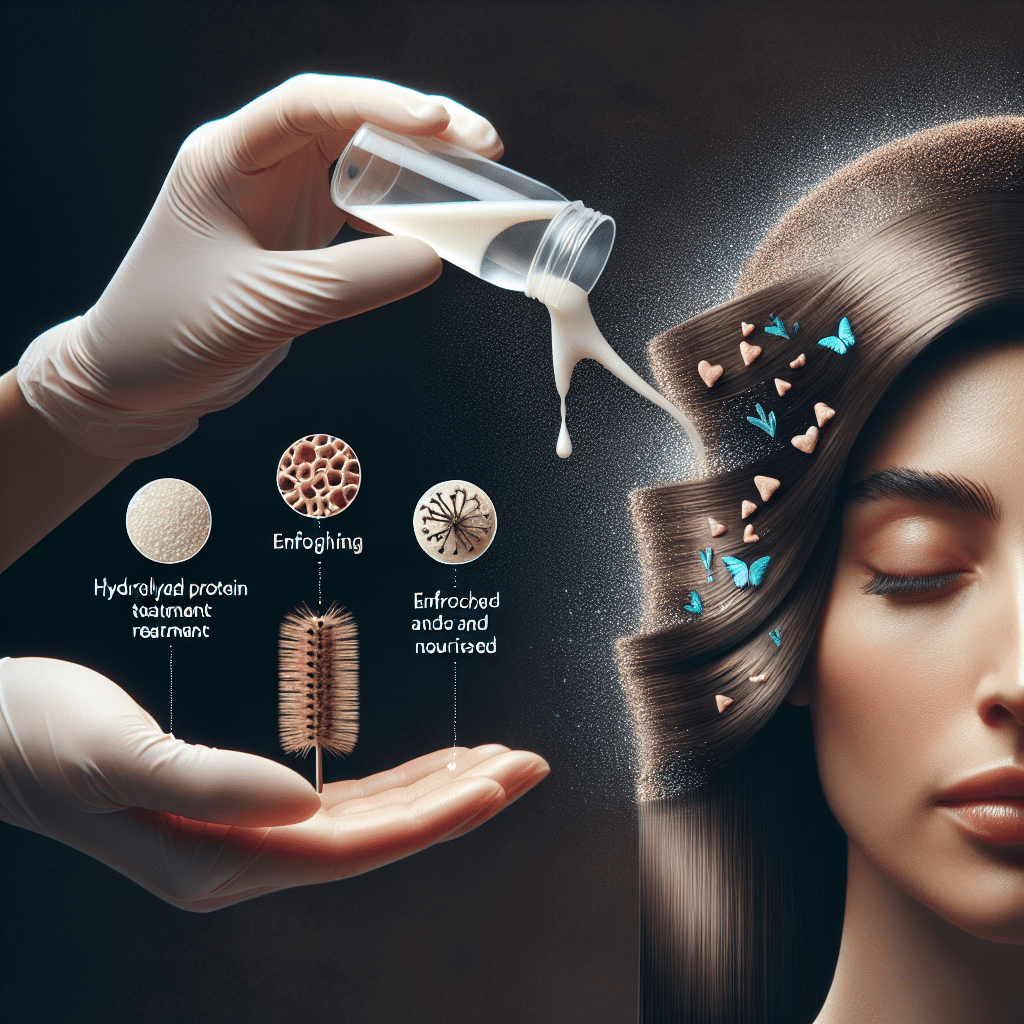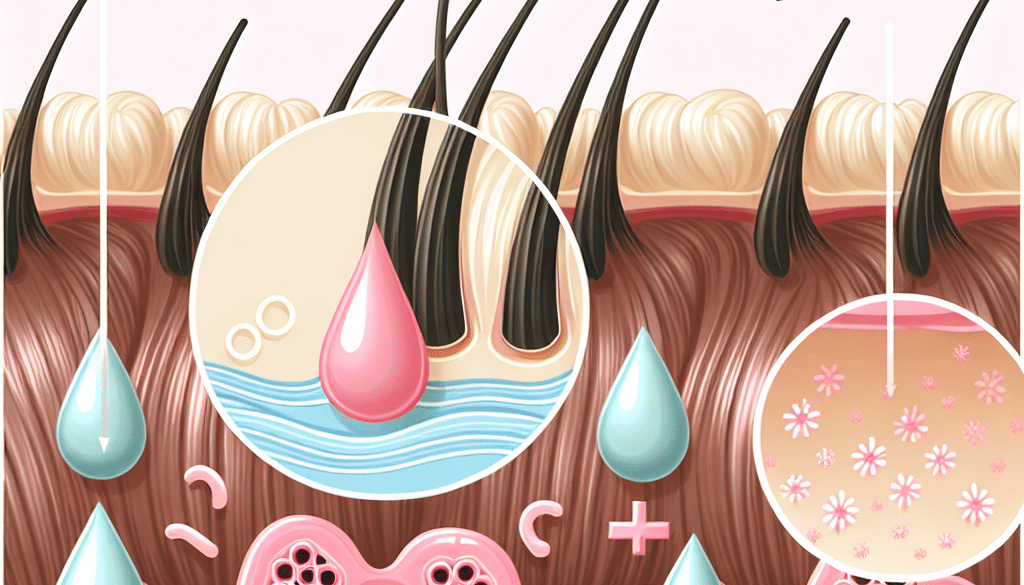Is Hydrolyzed Protein Good For Low Porosity Hair?
-
Table of Contents
- Hydrolyzed Protein for Low Porosity Hair: A Comprehensive Guide
- Understanding Low Porosity Hair
- What is Hydrolyzed Protein?
- Benefits of Hydrolyzed Protein for Low Porosity Hair
- How to Use Hydrolyzed Protein for Low Porosity Hair
- Case Studies and Research
- Choosing the Right Hydrolyzed Protein Products
- Conclusion: Is Hydrolyzed Protein the Answer for Low Porosity Hair?
- Discover ETprotein’s Premium Protein Products
Hydrolyzed Protein for Low Porosity Hair: A Comprehensive Guide

When it comes to hair care, understanding your hair’s porosity is crucial for selecting the right products. Low porosity hair, characterized by its tightly bound cuticle layer, can be particularly challenging to manage. This type of hair tends to resist moisture absorption, making it difficult to keep hydrated. One ingredient that has gained attention for its potential benefits for low porosity hair is hydrolyzed protein. In this article, we’ll explore whether hydrolyzed protein is indeed good for low porosity hair.
Understanding Low Porosity Hair
Before diving into the specifics of hydrolyzed protein, it’s important to understand what low porosity hair is and why it requires special care. Hair porosity refers to the hair’s ability to absorb and retain moisture. Low porosity hair has a tightly bound cuticle layer with overlapping scales that lay flat. This structure makes it challenging for water and other hair treatments to penetrate the hair shaft.
- Water and oils often sit on the surface of low porosity hair rather than being absorbed.
- Low porosity hair is prone to product buildup, which can lead to a feeling of heaviness and lackluster appearance.
- It often requires products that can penetrate the tight cuticle without weighing the hair down.
What is Hydrolyzed Protein?
Hydrolyzed protein is a form of protein that has been broken down into smaller fragments, known as peptides, through a process called hydrolysis. This process makes the protein more easily absorbable by the hair and skin. Hydrolyzed proteins are commonly derived from various sources, including soy, wheat, rice, and silk.
- Hydrolyzed proteins can penetrate the hair shaft more easily than their non-hydrolyzed counterparts.
- They are known to strengthen and repair the hair by filling in the gaps in the hair cuticle.
- These proteins can also add volume and shine to the hair.
Benefits of Hydrolyzed Protein for Low Porosity Hair
Hydrolyzed protein can offer several benefits for low porosity hair, which include:
- Moisture Retention: By penetrating the tight cuticle layer, hydrolyzed proteins can help low porosity hair retain moisture more effectively.
- Strength and Elasticity: These proteins can strengthen the hair shaft, reducing breakage and increasing elasticity.
- Reduced Frizz: By smoothing the hair cuticle, hydrolyzed proteins can lead to less frizz and more manageable hair.
- Enhanced Shine: Hair that is well-moisturized and has a smooth cuticle reflects light better, resulting in increased shine.
How to Use Hydrolyzed Protein for Low Porosity Hair
For those with low porosity hair, incorporating hydrolyzed protein into your hair care routine requires some consideration:
- Choose hair care products that list hydrolyzed proteins among the first few ingredients to ensure a higher concentration.
- Use protein treatments sparingly, as overuse can lead to protein overload, making the hair stiff and brittle.
- Apply heat when using protein treatments to help open up the cuticle and allow better absorption.
- Always follow up protein treatments with a moisturizing conditioner to maintain a balance between protein and moisture in your hair.
Case Studies and Research
Several studies have highlighted the effectiveness of hydrolyzed proteins for hair care. For instance, a study published in the Journal of Cosmetic Science found that hydrolyzed wheat protein significantly improved the tensile properties of hair, especially when combined with heat treatment. This suggests that low porosity hair could benefit from hydrolyzed protein treatments when used correctly.
Another study indicated that hydrolyzed rice protein increased hair volume and fullness, which can be particularly beneficial for those with low porosity hair that tends to look flat due to its resistance to moisture.
Choosing the Right Hydrolyzed Protein Products
When selecting hydrolyzed protein products for low porosity hair, consider the following:
- Opt for products specifically formulated for low porosity hair.
- Look for lightweight formulations that won’t cause buildup.
- Consider the source of the hydrolyzed protein; some individuals may have allergies or sensitivities to certain ingredients like wheat or soy.
Conclusion: Is Hydrolyzed Protein the Answer for Low Porosity Hair?
In conclusion, hydrolyzed protein can be a valuable addition to the hair care routine of those with low porosity hair. Its ability to penetrate the hair shaft and improve moisture retention, strength, and shine makes it an ingredient worth considering. However, it’s important to use hydrolyzed protein treatments judiciously to avoid protein overload and always balance them with adequate moisture.
Discover ETprotein’s Premium Protein Products
If you’re looking to incorporate hydrolyzed protein into your hair care regimen, ETprotein offers a range of high-quality protein products that could be beneficial for low porosity hair. Their products are organic, non-GMO, and allergen-free, ensuring that you’re using only the best ingredients for your hair.
ETprotein’s offerings include various plant-based proteins that are gentle yet effective for hair care. Whether you’re formulating your own hair products or seeking ready-made solutions, ETprotein has options that cater to the specific needs of low porosity hair.
About ETprotein:
ETprotein, a reputable protein and L-(+)-Ergothioneine (EGT) Chinese factory manufacturer and supplier, is renowned for producing, stocking, exporting, and delivering the highest quality organic bulk vegan proteins and L-(+)-Ergothioneine. They include Organic rice protein, clear rice protein, pea protein, clear pea protein, watermelon seed protein, pumpkin seed protein, sunflower seed protein, mung bean protein, peanut protein, and L-(+)-Ergothioneine EGT Pharmaceutical grade, L-(+)-Ergothioneine EGT food grade, L-(+)-Ergothioneine EGT cosmetic grade, L-(+)-Ergothioneine EGT reference grade and L-(+)-Ergothioneine EGT standard. Their offerings, characterized by a neutral taste, non-GMO, allergen-free attributes, with L-(+)-Ergothioneine purity over 98%, 99%, cater to a diverse range of industries. They serve nutraceutical, pharmaceutical, cosmeceutical, veterinary, as well as food and beverage finished product distributors, traders, and manufacturers across Europe, USA, Canada, Australia, Thailand, Japan, Korea, Brazil, and Chile, among others.
ETprotein specialization includes exporting and delivering tailor-made protein powder and finished nutritional supplements. Their extensive product range covers sectors like Food and Beverage, Sports Nutrition, Weight Management, Dietary Supplements, Health and Wellness Products, and Infant Formula, ensuring comprehensive solutions to meet all your protein needs.
As a trusted company by leading global food and beverage brands and Fortune 500 companies, ETprotein reinforces China’s reputation in the global arena. For more information or to sample their products, please contact them and email sales(at)ETprotein.com today.












